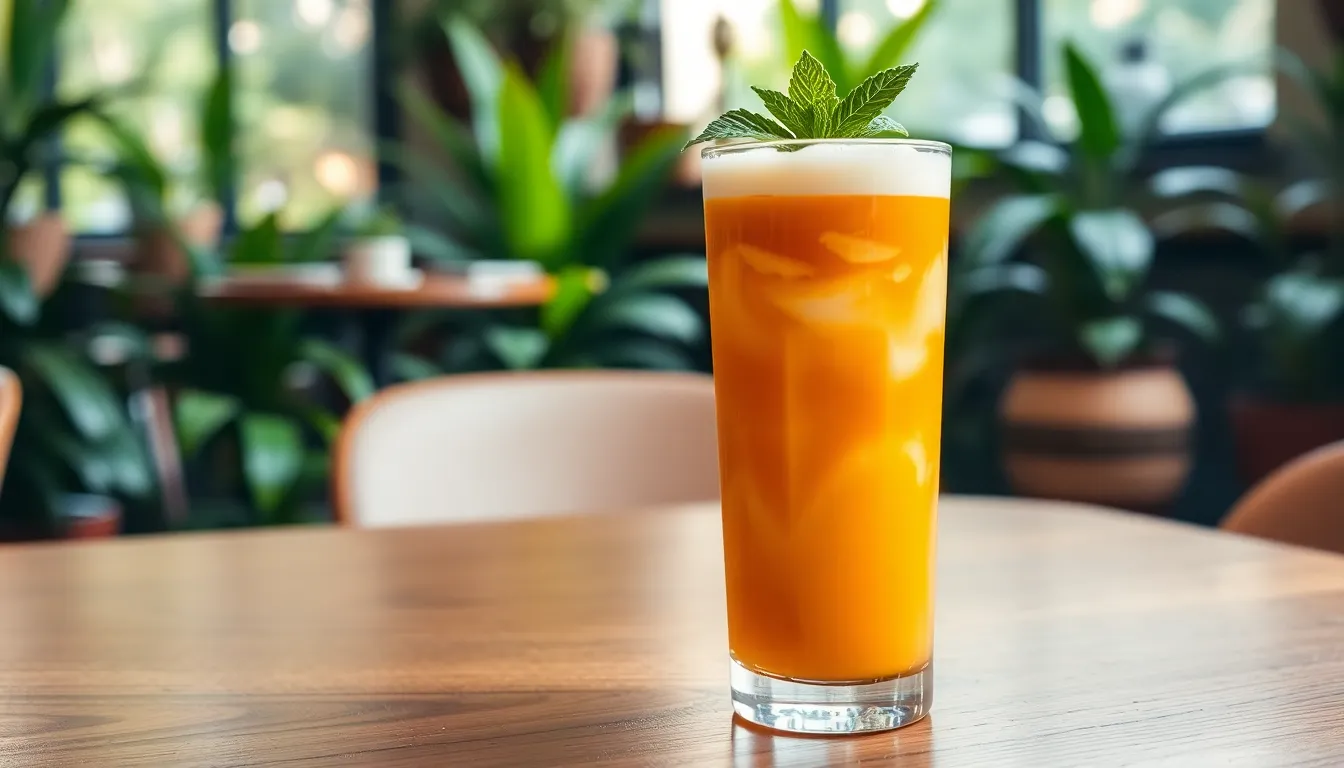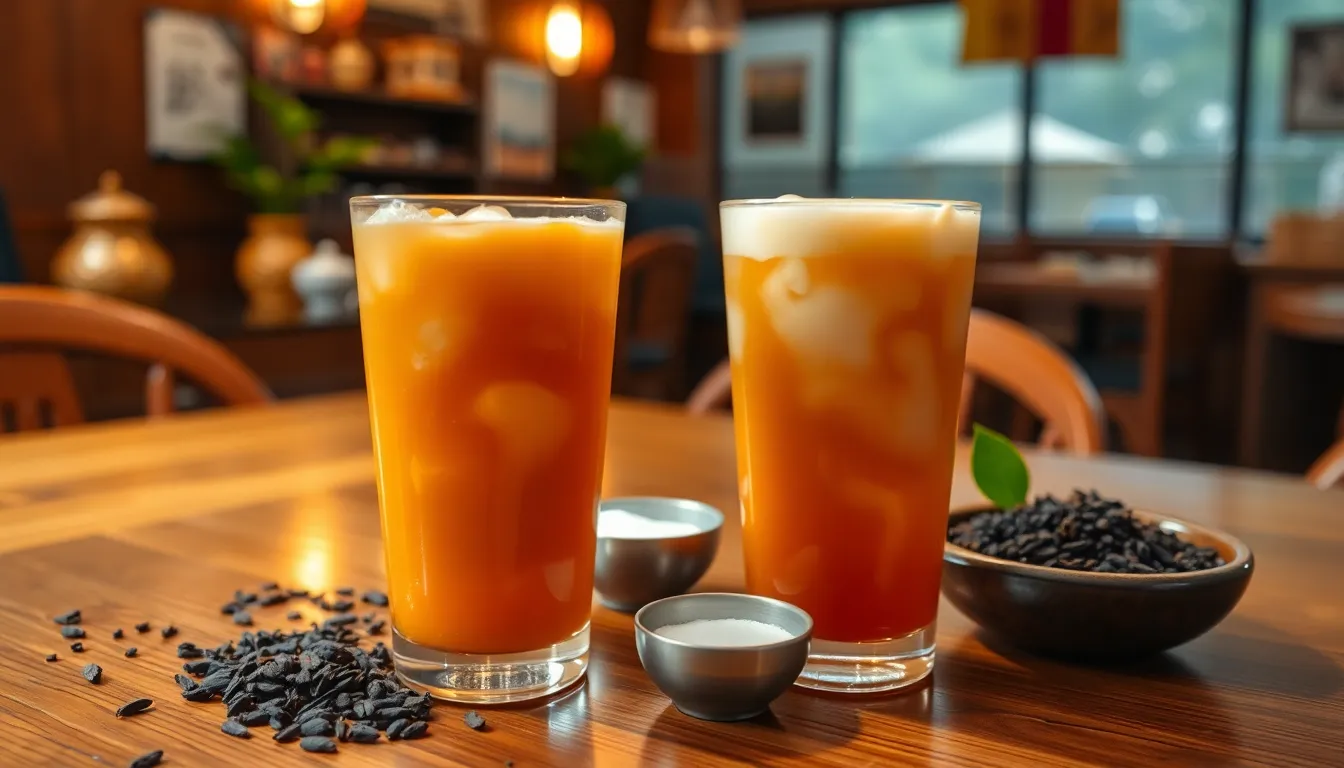Thai iced tea is a delightful blend of sweet, creamy goodness that has captured hearts and taste buds worldwide. But as you sip this vibrant orange concoction, have you ever wondered if it packs a caffeine punch? After all, nobody wants to accidentally trade their afternoon pick-me-up for a dessert in a glass.
Table of Contents
ToggleOverview of Thai Iced Tea
Thai iced tea features a distinctive blend of black tea, sugar, and condensed milk, creating a rich and creamy beverage. It showcases vibrant orange color, appealing to many. Horned by its origins in Thailand, Thai iced tea became popular in Southeast Asian restaurants worldwide.
This beverage typically contains strong brewed black tea, which naturally has caffeine. From approximately 40 to 70 mg of caffeine per 8 ounces, the caffeine content varies based on the brewing method and tea used. Sugar levels contribute to its sweetness, making it a delightful treat for those seeking a sugar rush alongside their caffeine.
Condensed milk plays a significant role in the drink’s creamy texture. It balances the bitterness of the tea and the sweetness of the sugar. Variations, like those using almond or coconut milk, exist, appealing to different dietary preferences.
Enjoying Thai iced tea can be a refreshing experience any time of day. While many people appreciate it as a dessert beverage, others consume it for its energizing effects. Healthy servings often come with added flavorings such as spices or vanilla, enhancing the overall taste profile.
Thai iced tea combines strong black tea with sweetness and creaminess. Its caffeine content offers an energizing boost, making it an appealing option for many looking for a flavorful and stimulating drink.
Ingredients of Thai Iced Tea

Thai iced tea consists of several key ingredients that create its unique flavor profile. The combination of these elements results in a vibrant, creamy beverage enjoyed by many.
Black Tea Base
Black tea serves as the primary base for Thai iced tea. It delivers a strong flavor that forms the foundation of the drink. Typically, a robust variety, like Ceylon or Assam tea, is chosen for its rich taste and higher caffeine content. The brewing process, which can vary, usually involves steeping the tea leaves in hot water for several minutes. This method ensures the extraction of essential flavors and caffeine from the leaves. The resulting brew contributes approximately 40 to 70 mg of caffeine per 8-ounce serving, a notable factor for tea enthusiasts seeking a pick-me-up.
Additional Flavorings
Additional flavorings enhance the complexity of Thai iced tea. Sugar plays a crucial role in balancing the tea’s natural bitterness, allowing for a sweeter taste. Condensed milk, another essential ingredient, adds a creamy richness to the drink, creating a smooth mouthfeel. Various adaptations might include spices like star anise or cardamom, infusing the beverage with aromatic notes. Some recipes even incorporate vanilla for a touch of sweetness. These flavorings not only elevate the drink but also cater to diverse palates, making Thai iced tea an appealing choice for many.
Caffeine Content in Thai Iced Tea
Thai iced tea contains caffeine, adding to its appeal as a revitalizing beverage. The caffeine content can vary based on preparation methods and tea types used.
Factors Affecting Caffeine Levels
Brewing time influences caffeine extraction; longer infusions yield higher levels. Tea varieties also play a role. Robust options like Ceylon or Assam feature greater caffeine concentrations. Sweetening with sugar or adding condensed milk does not impact caffeine amounts. Preparation methods, such as steeping temperature and duration, directly affect caffeine levels.
Comparison with Other Teas
Thai iced tea generally has caffeine ranges between 40 to 70 mg per 8 ounces. In contrast, a standard cup of brewed black tea contains about 40 to 70 mg as well. Green tea offers less caffeine, averaging around 20 to 45 mg per 8 ounces, depending on steeping time. Herbal teas often lack caffeine altogether, providing a different drinking experience. Comparatively, matcha has a higher content, averaging about 70 mg per serving.
Health Effects of Caffeine in Thai Iced Tea
Caffeine in Thai iced tea can significantly influence health. Understanding its effects helps consumers make informed choices about their beverage selections.
Benefits of Moderate Caffeine Intake
Moderate caffeine intake offers several health benefits. It enhances alertness and concentration, making tasks easier to manage. Additionally, caffeine may improve physical performance, benefiting those who engage in exercise. Research suggests that it could lower the risk of certain diseases, including Parkinson’s and Alzheimer’s. Finally, the antioxidants present in black tea contribute to overall health, potentially offering protection against various conditions.
Potential Downsides
Excessive caffeine consumption can lead to negative health effects. Symptoms like insomnia, nervousness, and increased heart rate often arise due to high caffeine levels. Additionally, some individuals may experience stomach irritation or digestive issues. Pregnant women and those with specific heart conditions should particularly monitor their caffeine intake. Withdrawal symptoms can also occur for regular consumers who suddenly reduce their caffeine consumption. Balancing caffeine intake maintains its positive effects while minimizing potential drawbacks.
Thai iced tea is more than just a delightful treat; it also packs a moderate caffeine punch. With its vibrant orange hue and creamy texture, it offers a unique blend of flavors that appeals to many. For those looking for a boost in energy without overwhelming caffeine levels, this beverage strikes a perfect balance.
Understanding the caffeine content is crucial for making informed choices about consumption. Whether enjoyed as a midday pick-me-up or a sweet dessert, Thai iced tea can be a satisfying option. As with any caffeinated drink, moderation is key to enjoying its benefits while avoiding potential downsides.



